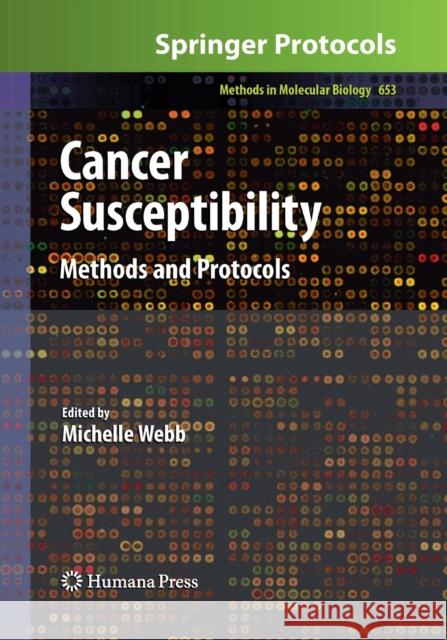Cancer Susceptibility: Methods and Protocols » książka



Cancer Susceptibility: Methods and Protocols
ISBN-13: 9781493957606 / Angielski / Miękka / 2016 / 295 str.
Cancer Susceptibility: Methods and Protocols
ISBN-13: 9781493957606 / Angielski / Miękka / 2016 / 295 str.
(netto: 536,72 VAT: 5%)
Najniższa cena z 30 dni: 539,74
ok. 16-18 dni roboczych.
Darmowa dostawa!
In this book, experts bring together the most recent technological developments for identifying and screening cancer susceptibility genes. This is a timely collection that seeks to provide researchers with the tools to predict and combat cancer.
From the reviews:
"This well-written and concise book is very timely, given the significant advances in the understanding of molecular genetics of cancer over the past two decades that led to the identification of genes which, when mutated, result in increased susceptibility to disease. ... It is written for scientists and clinicians ... . This book will be valuable resource for students, scientists, clinical oncologists, and other researchers interested in learning about cancer susceptibility." (Omer Iqbal, Doody's Review Service, February, 2011)
"Michelle Webb is attempting to give the readers the tools to achieve just that in the oncology field. The book provides up to date protocols and guides aimed at identification of mutations in the known cancer susceptibility genes as well as guides on how to search new ones. ... this book provides valuable and relevant information about susceptibility genes analysis and I'm sure it won't spend too much time just lying on the shelf in any research or clinical lab in this field." (J. Markus, Neoplasma, February, 2011)
"Cancer susceptibility methods and protocols is an up to date book illustrating a collection of molecular protocols intended to represent the basic and advanced molecular techniques which used to identify and screen for cancer susceptibility genes. ... This book deserves great praise for the readable presentation of this complex field. ... a valuable authoritative and accessible resource for the current molecular methods used to explore and screen for cancer genes. Both cancer biologists and very specialized clinicians ... will find this book a good reference." (Abeer Alsaegh and Diana M. Eccles, Human Genetics, Vol. 131, 2012)
Part I: Identifying Cancer Susceptibility Genes 1. The Identification of Colon Cancer Susceptibility Genes by Using Genome-Wide Scans Denise Daley 2. Prioritizing Candidate Genetic Modifiers of BRCA1 and BRCA2 Using a Combinatorial Analysis of Global Expression and Polymorphism Association Studies of Breast Cancer Logan C. Walker and Amanda B. Spurdle 3. Microarray Based Comparative Genomic Hybridization (Array-CGH) as a Useful Tool for Identifying Genes Involved in Glioblastoma (GBM) Yolanda Ruano, Manuela Mollejo, Angel Rodríguez de Lope, José Luis Hernández-Moneo, Pedro Martínez, and Bárbara Meléndez 4. Multiplex Amplifiable Probe Hybridization (MAPH) Methodology as an Alternative to Comparative Genomic Hybridization (CGH) Ludmila Kousoulidou, Carolina Sismani, and Philippos C. Patsalis 5. Utilizing Saccharomyces cerevisiae to Identify Aneuploidy and Cancer Susceptibility Genes Erin D. Strome and Sharon E. Plon 6. Computational Identification of Cancer Susceptibility Loci Marko Laakso, Sirkku Karinen, Rainer Lehtonen, and Sampsa Hautaniemi 7. Digital Candidate Gene Approach (DigiCGA) for Identification of Cancer Genes Meng-Jin Zhu, Xiang Li, and Shu-Hong Zhao Part II: Screening Cancer Susceptibility Genes 8. The Use of Denaturing High Perfomance Liquid Chromatography (DHPLC) For Mutation Scanning of Hereditary Cancer Genes Deborah J. Marsh PhD and Viive M. Howell 9. Enhanced Mismatch Mutation Analysis: Simultaneous Detection of Point Mutations and Large Scale Rearrangements by Capillary Electrophoresis, Application to BRCA1 and BRCA2 Claude Houdayer, Virginie Moncoutier, Jérôme Champ, Jérémie Weber, Jean-Louis Viovy, and Dominique Stoppa-Lyonnet 10. Economical Protocol for Combined Single-Strand Conformation Polymorphism and Heteroduplex Analysis on a Standard Capillary Electrophoresis Apparatus Piotr Kozlowski and Wlodzimierz J. Krzyzosiak 11. Mutational Screening of hMLH1 and hMSH2 that Confer Inherited Colorectal Cancer Susceptibility Using Denature Gradient Gel Electrophoresis (DGGE) Tao Liu 12. s-RT-MELT: A Novel Technology for Mutation Screening Jin Li and G. Mike Makrigiorgos 13. Zoom-In Array Comparative Genomic Hybridization (aCGH) to Detect Germline Rearrangements in Cancer Susceptibility Genes Johan Staaf and Åke Borg 14. Development of a Scoring System to Screen for BRCA1/2 Mutations Gareth R. Evans and Fiona Lalloo 15. Use of Splicing Reporter Minigene Assay to Evaluate the Effect on Splicing of Unclassified Genetic Variants Pascaline Gaildrat, Audrey Killian, Alexandra Martins, Isabelle Tournier, Thierry Frébourg, and Mario Tosi 16. Functional Analysis of Human BRCA2 Variants Using a Mouse Embryonic Stem Cell-Based Assay Sergey G. Kuznetsov, Suhwan Chang, and Shyam K. Sharan 17. Developing Functional Assays for BRCA1 Unclassified Variants Michelle Webb
Over the past two decades, spectacular advances have been made in our understanding of the molecular genetics of cancer, leading to the pursuit of identifying genes that, when mutated, result in an increased susceptibility to the disease. In Cancer Susceptibility: Methods and Protocols, experts in the field bring together the most recent technological developments for identifying and screening cancer susceptibility genes. Divided into two clear sections, the book begins with gene identification, which updates and informs scientists working at identifying novel cancer susceptibility genes, while the second part deals with mutation screening technologies that aid scientists and clinicians working to translate this knowledge into the clinic. Written in the highly successful Methods in Molecular Biology™ series format, chapters contain introductions to their respective topics, lists of the necessary materials and reagents, step-by-step, readily reproducible laboratory protocols, and notes on troubleshooting and avoiding known pitfalls. Authoritative and cutting-edge, Cancer Susceptibility: Methods and Protocols is a timely collection that seeks to provide researchers with the tools to predict and combat this terrible disease.
1997-2026 DolnySlask.com Agencja Internetowa
KrainaKsiazek.PL - Księgarnia Internetowa









